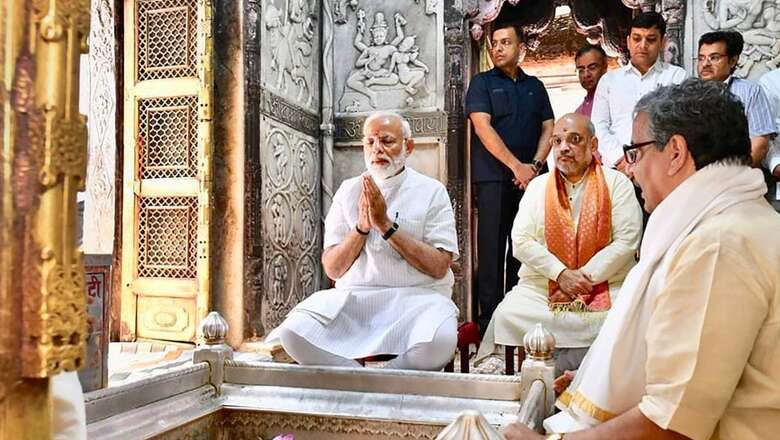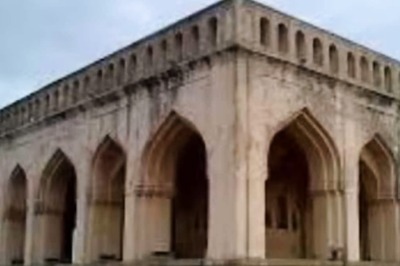
views
Since 2014, a sharp schism has emerged which is getting sharper by the day in the Bharatiya samaj. I am not talking of the oft-repeated Hindu-Muslim divide, the caste divide, the rich-poor or the North-South divide. In the context of power, the only divide of significance in our country has been between the minority of elites, those alienated few, imitators, who seeped in the modern/western value system with all its various attributes, completely alienated from their cultural and civilisational roots and the majority of the disempowered ordinary Bharatiyas, still connected with their roots.
This important divide has been under wraps, not even recognised and acknowledged, but is now emerging in its starkness. All other divisions (except the rich-poor) have been largely blown up for political exigencies. They dwarf in front of this one and if this divide can be bridged, then other divisions will get consumed and become redundant.
Different governments have come and gone, even the Britishers came and were sent back but this alienated minority always managed to remain close to power. After independence, Nehru and his Congress party, with the backing of international power centres, made sure that all four pillars of (modern) democracy remained firmly in the grip of this alienated minority, keeping the majority at bay, only to be used and at times pitied. This status quo got so deeply entrenched in the system that over time, even the disempowered majority started believing that to be part of the power structure, one had to be baptised and exorcised of one’s roots and adopt different value systems and all that comes with it as necessary baggage, to get entry into that rarefied circle and enjoy the fruits of power.
It is the good fortune of this country that in 2014, finally, a crack appeared in at least one of the pillars for the first time after independence. The Citadel of power structure that looked invincible finally gave in. We have had non-Congress governments in the past, in 1977 (Morarji Desai), 1989 (VP Singh), 1990-91 (Chandrashekhar), and 1998 (Atal Bihari Bajpayee), but the changes they brought in were more cosmetic, not fundamental. Lutyens’ Delhi had the power and magic to convert even a hard-core desi. But this change since 2014 is unlike any other, it is monumental. It has rocked the (Lutyens’) boat, unleashing dormant energy suffocating for centuries. It would be a mistake to see this change merely from a short-term political lens.
This change is more than merely political. It has unknowingly and silently ignited and resonated with the majority still connected with their civilisational roots. It has struck a chord with them. It is something similar to the experience of Sri Hanuman when the wise Jamvant awakened him to realise his hidden powers that hitherto he was not aware of. After a long time, the majority of ordinary people are sensing freedom. They are experiencing the joy of breathing freely. This has suddenly made them aware of their (silent) power and has given them the confidence to value and appreciate themselves and their ways and not feel diffident and ashamed as they were used to.
It is a major disruption. The alienated erstwhile powerful elite comprising the privileged minority is unable to fathom this change. They are extremely uneasy with this, unable to understand, let alone digest it. They are experiencing acute indigestion with all the ensuing side effects from diarrhoea, constipation and as a result, various obnoxious effluents are coming out of various orifices which can be seen in their desperation to go to any extent to revert to good old ways. The malaise, with which this alienated minority, now baffled, is afflicted, is deep and chronic.
If this lot wishes to make sense of the civilisational churning that is happening, they will have to look not outside (as they are used to), but deep within themselves. In this process of self-examination, the alienated minority will be required to see themselves dispassionately, almost similar to the way one is required to observe one’s thoughts and feelings during meditation. And this is not going to be easy. Most of them will back off and revert to their old ways of ignoring reality and putting all their energies into creating the same old world they have been so comfortable with.
But those few like us who are neither there nor here, those who have also been a part of that elite power structure from time to time and have enjoyed its fruits, but with some quirk of fortune have also remained connected with the roots of this great civilisation, may go through this yagna and come out purified, realising that all the various masks one has been wearing all these years, only to belong to that false but rarefied atmosphere of power elite, were so unnecessary and burdensome. After going through this anointment, it will be like coming home (ghar wapsi), being able to relate with our long-lost brothers and sisters, and realising, perhaps for the first time, the greatness of this (Bharatiya) civilisation. We will be able to appreciate the greatness of our ordinary people and their ways rather than looking at them condescendingly.
This is a period of great churning, the likes of which are rarely seen, even in centuries, and this change is happening not just in Bharat but all over the world. These changes need to be seen from a broader perspective, without attributing the cause to a particular person(s) or a political party, but to rise above these old ways. Otherwise, we are bound to be afflicted with old biases and prejudice which by their very nature narrow down our vision and make it selective. Old habits and conditioning are not easy to deal with. This is not to say that the immediate causes (individuals or the nimitta karana) are not important. For the individuals who have been instrumental in bringing about this change, I have great respect, but the changes taking place are of a much bigger dimension and go beyond the material/physical realm, and hence the nimitta are only playing the role of an instrument in a grander design beyond the scope of mere mortals.
Only to reinforce what is being said about the great unfolding that is happening, but without getting into the details, let us look at the significant changes taking place in the Islamic world – Iran, Saudi Arabia and the UAE and also the dormant but huge ex-Muslim movement all over including our country, getting ready to explode very soon.
It is only a matter of time and when that happens, it is bound to have major repercussions all over the world and in particular, in the Bharatiya sub-continent. Another indication of this great upheaval can be seen in the process of de-dollarisation, which has started in a small way. This too is bound to bring about unprecedented changes in the world. These are all pointing towards a major reshuffle in the relationships within and between nations. A massive realignment.
We need to observe the changes with an open mind, leaving our old ways aside, and refrain from thinking in old categories, frameworks of ideas and ideologies. We will have to make a paradigm shift within ourselves, in our thought process from the usual way of understanding/making sense of the world.
Even while making a genuine effort, in the end, the biggest hurdle will be our moha, a huge attachment to our individual identities cultivated so assiduously over the years to be known, to belong, to make ourselves eligible to run the race. These identities are embedded with all those afflictions that come in the way of seeing things afresh. Even though this is difficult, it is not impossible.
If we are able to cross this hurdle, then we experience a sense of liberation, an unburdening and perhaps for the first time, appreciate the beauty and grandeur of this great Bharatiya civilisation. We are then able to see and appreciate the innate beauty in our ordinary majoritarian populace who do not bother about individual identities and are sahaj, comfortable with themselves, who lead or try to lead their lives according to human values (dharma) rather than superfluous and false value system that we have gotten so used to.
2014 was a watershed year unleashing an amazing energy residing in our majority of ordinary people who, for the first time, were able to find a voice, a space for themselves. They do not have to feel ashamed of themselves or their ways anymore. We need to recognise this. In the fear that if we begin appreciating this beautiful change then will have to give credit to someone we abhor (out of old conditioning), let us not stop ourselves. The change demands that we get over all these past habits and see and appreciate what is unfolding in front of us, being magnanimous to know human beings are not perfect and the path to retrieval and resurgence is not going to be smooth sailing. This is the time of prayashchit (atonement) for the minority, paving the way for ghar wapsi (coming home).
Be it Kashi Vishwanath, Mahakal, installation of Netaji’s statue on Kartavya Path and now the Pran Pratishtha ceremony of Ram Mandir, all this needs to be seen as major milestones in this process of civilisational resurgence.
The author is writer, educator, public speaker. He has been working in the area of education through an organisation SIDH that he set up 35 years ago. Views expressed in the above piece are personal and solely those of the author. They do not necessarily reflect News18’s views.

















Comments
0 comment